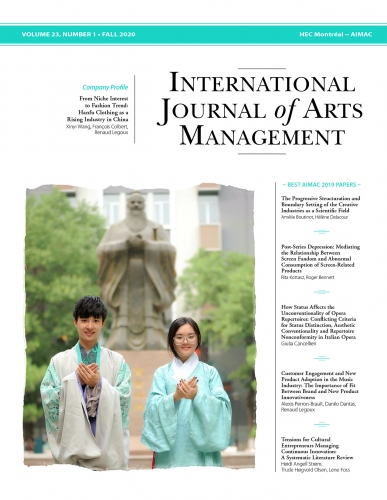Post-Series Depression: Mediating the Relationship Between Screen Fandom and Abnormal Consumption of Screen-Related Products
Product: Article
$21.00 CA
Rita Kottasz, Roger Bennett
Rita Kottasz is an associate professor of marketing in the Department of Strategy, Marketing and Innovation at Kingston University, London. She is Editor-in-Chief of the International Journal of Nonprofit and Voluntary Sector Marketing and Deputy Chair of the Academy of Marketing Special Interest Group on Arts, Heritage, Non-profit and Social Marketing. Her main research interests lie in the areas of arts and non-profit marketing, notably issues to do with fundraising, donor behaviour and cultural consumption. She has recently published in Transportation Research Part A: Policy and Practice, Transportation Research Part F: Traffic Psychology and Behaviour, Arts and the Market, Museum Management and Curatorship and European Management Review.
Roger Bennett is a professor of marketing at Kingston University, London. His main research interests lie in the fields of non-profit and voluntary sector marketing and marketing of the arts. Recently, he has also been involved in research concerning the availability of new transportation technologies to people with physical and/ or intellectual disabilities and marketing to people with disabilities more generally. He is the author of many books and a large number of journal articles on various aspects of marketing and business management.
ABSTRACT
This article examines the effects on buying behaviour of a concept not discussed in the arts marketing literature, post-series depression (PSD). The issue is explored in the context of the arts and leisure industries, domains where the concept of PSD is especially relevant. PSD is a sadness felt after watching a lengthy film or TV series and the bitter feeling of knowing that the journey is over but not wanting it to end. A model involving fandom, PSD, two “consumption hooks” and three entertainment-seeking drivers was constructed and hypothesized to explain aspects of the buying behaviour of avid fans of arts and leisure products. The model was tested using a moderated-mediation estimation method. With relatively minor exceptions, the results provide a good fit to data obtained from a sample of 587 self-declared fans of a film or TV series (e.g., the Harry Potter series).
KEYWORDS
Fandom, process mediation, post-series depression, binge-watching, cross-platform engagement
RÉSUMÉ
Cet article traite des effets sur le comportement d’achat d’un phénomène dont la littérature consacrée au marketing des arts ne parle pas : la dépression post-série (DPS). Cette question est explorée dans le contexte des arts et des industries du divertissement, où le concept de DPS est particulièrement pertinent. La DPS se caractérise par un sentiment de tristesse après le visionnement d’un long film ou d’une série télévisée ainsi que par une certaine amertume à l’idée que l’aventure est terminée. Un modèle comportant différents éléments (dont la ferveur des fans et la DPS, deux variables liées à la consommation de films et de séries, ainsi que trois facteurs de divertissement) a été élaboré et a permis aux auteurs de formuler des hypothèses pour expliquer divers aspects du comportement d’achat des fans des productions des arts et des industries du divertissement. Ce modèle a été testé à l’aide d’une méthode d’estimation fondée sur la médiation modérée. À quelques petites exceptions près, les résultats correspondent aux données obtenues auprès d’un échantillon de 587 fans d’un film ou d’une série télévisée (p. ex., la saga des films Harry Potter).
MOTS CLÉS
Ferveur des fans, processus de médiation, dépression post-série, visionnage en rafale, engagement multiplateforme
RESUMEN
En este artículo se analizan los efectos de la depresión postserie (DPS) sobre el comportamiento de compra, un concepto que no se ha abordado en la literatura sobre el mercadeo de las artes. Se explora el tema en el contexto de las industrias de las artes y del ocio, campos en los cuales la DPS tiene particular pertinencia. La DPS es un sentimiento de tristeza que se instala después de haber visto una serie de películas o una serie televisada largas, y una sensación de amargura al saber que el viaje llegó a su fin y no querer que termine. Para elaborar hipótesis se construyó un modelo que incorpora el fandom, o el mundo de los seguidores, la DPS, dos “enganches de consumo” y tres motivaciones tras la búsqueda de entretenimiento con el fin de explicar ciertos aspectos del comportamiento de compra de los seguidores ávidos de los productos de arte y ocio. Se puso el modelo a prueba utilizando un método de estimación de mediación moderada. Con algunas excepciones menores, los resultados cuadran bien con los datos obtenidos a partir de un muestreo de 587 seguidores autodeclarados de una serie de películas o una serie televisada (ej. la serie Harry Potter).
PALABRAS CLAVE
El mundo de los seguidores, mediación de proceso, depresión postserie, binge-watching, maratón de series, implicación Multiplataforma

